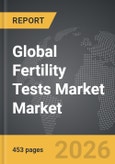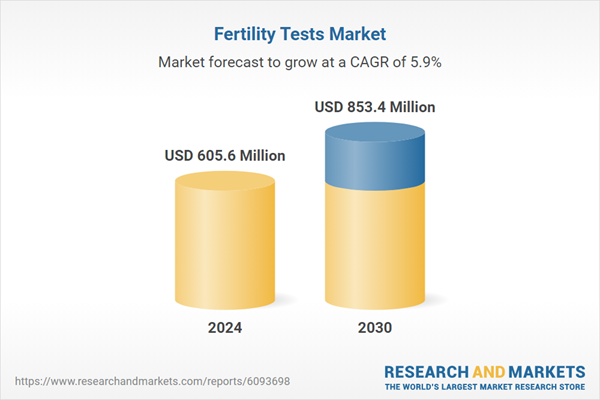Global Fertility Tests Market - Key Trends & Drivers Summarized
Why Are Fertility Tests Gaining Prominence in Modern Reproductive Health Management?
Fertility tests have become increasingly vital in today's reproductive healthcare landscape, driven by demographic shifts, lifestyle factors, and the rising global focus on personalized medicine. As couples increasingly delay parenthood due to career, financial, or personal reasons, the awareness and urgency surrounding reproductive health have significantly grown. Fertility tests provide essential insights into an individual's reproductive potential, helping identify issues such as hormonal imbalances, ovulatory dysfunction, or low sperm count that could hinder conception. These diagnostic tools range from home-based ovulation kits and sperm analyzers to advanced clinical testing, including anti-Müllerian hormone (AMH) levels, follicle-stimulating hormone (FSH) assays, and ultrasound assessments. For women, early testing can highlight age-related fertility decline or underlying conditions like polycystic ovary syndrome (PCOS) or endometriosis, while for men, semen analysis can quickly indicate potential infertility factors. As infertility affects approximately one in six couples globally, timely and accurate fertility assessments are becoming indispensable for early intervention and effective treatment planning. These tests not only empower individuals and couples with knowledge but also support clinicians in crafting tailored reproductive therapies or assisted reproductive technology (ART) strategies. The role of fertility testing has thus expanded beyond diagnosis - it now forms the foundation of proactive fertility planning, family-building decisions, and long-term reproductive wellness.How Are Innovations in Diagnostics and Digital Health Enhancing Fertility Testing Capabilities?
Rapid advancements in diagnostic technologies, digital health platforms, and biosensor engineering are revolutionizing fertility testing by making it more accurate, accessible, and user-friendly. Traditional lab-based hormone assays and semen analyses are now being complemented by high-precision home testing kits that utilize immunoassays, mobile apps, and AI-driven analytics to deliver fast and reliable results. Ovulation prediction kits (OPKs) have evolved from simple LH-detection strips to smart trackers that combine basal body temperature monitoring, cervical mucus analysis, and hormone detection for a multi-parameter approach to fertility window prediction. Similarly, male fertility has seen breakthroughs with at-home semen testing devices that assess parameters like motility, count, and morphology using smartphone-based microscopes and machine learning algorithms. Clinical testing is also being enhanced through advanced biomarker panels that assess ovarian reserve, hormonal balance, and genetic predispositions with greater sensitivity and specificity. Telehealth platforms are enabling remote consultations and digital tracking of fertility metrics, making ongoing monitoring more convenient for patients undergoing ART or hormonal therapies. Furthermore, integration with wearable technology, such as smart thermometers and hormone sensors, is allowing continuous, non-invasive fertility tracking in real time. These innovations are breaking down barriers to fertility care by reducing stigma, increasing affordability, and bringing reproductive health insights directly to users - especially critical in rural or underserved regions where clinical infrastructure may be lacking.Why Is Demand for Fertility Tests Growing Across Demographics and Global Markets?
The global demand for fertility tests is expanding rapidly, influenced by shifting societal norms, demographic trends, and increasing awareness of reproductive health. In developed regions, the rising age of first-time parents - particularly women over 35 - has made fertility testing a proactive health measure rather than a reactive one. Individuals and couples are seeking to understand their reproductive timelines well in advance of attempting conception, leading to the growth of elective fertility assessments. Meanwhile, the growing prevalence of infertility-related conditions such as PCOS, thyroid disorders, obesity, and lifestyle-induced hormonal imbalances is further accelerating demand for diagnostic solutions. In emerging markets, increasing access to healthcare, rising disposable income, and greater public health awareness are fueling the adoption of fertility tests, both in clinical and at-home formats. Cultural shifts, including the acceptance of assisted reproductive technologies and the growing number of single parents and LGBTQ+ couples pursuing parenthood, are broadening the fertility test user base beyond traditional heterosexual couples. Fertility clinics, wellness centers, and e-commerce platforms are also contributing to this trend by offering packaged fertility test kits, often bundled with teleconsultations and digital fertility planning tools. Regionally, North America and Europe dominate the market due to advanced healthcare systems, but Asia-Pacific is experiencing the fastest growth due to increased infertility rates and improving access to diagnostics. This global demand surge reflects a broader move toward personalized, preventive, and patient-empowered fertility care.What Key Factors Are Fueling the Continued Growth of the Fertility Tests Market Worldwide?
The continued growth of the fertility tests market is driven by a convergence of medical, technological, societal, and commercial factors that reflect the evolving needs of modern families. A significant driver is the increasing incidence of infertility, attributed to stress, environmental pollutants, sedentary lifestyles, and delayed childbearing - factors affecting both male and female reproductive health. Governments and public health bodies are also promoting reproductive education and fertility awareness, supporting early diagnosis through subsidized screening programs and awareness campaigns. Advances in biomedical research have led to the identification of more precise fertility biomarkers, facilitating earlier and more accurate diagnoses, while personalized medicine initiatives are pushing healthcare providers to offer tailored fertility assessments. On the commercial front, growing investment in femtech and digital health startups is resulting in innovative fertility tracking tools, smart test kits, and online platforms that cater to tech-savvy, health-conscious consumers. The convenience of over-the-counter and subscription-based fertility test services is also increasing adoption among younger demographics seeking proactive reproductive planning. Furthermore, partnerships between diagnostic companies, fertility clinics, and telehealth providers are creating integrated care ecosystems that streamline the journey from diagnosis to treatment. Regulatory support, improved data privacy frameworks, and the inclusion of fertility services in insurance plans are further reducing barriers to access. Together, these factors are positioning fertility tests not just as a medical necessity but as a central pillar of reproductive empowerment and modern wellness.Report Scope
The report analyzes the Fertility Tests market, presented in terms of market value (US$). The analysis covers the key segments and geographic regions outlined below:- Segments: Product (Ovulation Prediction Kit, Fertility Monitors, Male Fertility Testing Products); Purchase Mode (OTC-based Products, Prescription-based Products); Application (Female Fertility Testing, Male Fertility Testing); End-User (Home Care Setting, Hospitals / Fertility Testing).
- Geographic Regions/Countries: World; United States; Canada; Japan; China; Europe (France; Germany; Italy; United Kingdom; Spain; Russia; and Rest of Europe); Asia-Pacific (Australia; India; South Korea; and Rest of Asia-Pacific); Latin America (Argentina; Brazil; Mexico; and Rest of Latin America); Middle East (Iran; Israel; Saudi Arabia; United Arab Emirates; and Rest of Middle East); and Africa.
Key Insights:
- Market Growth: Understand the significant growth trajectory of the Ovulation Prediction Kit segment, which is expected to reach US$521.2 Million by 2030 with a CAGR of a 6.4%. The Fertility Monitors segment is also set to grow at 4.5% CAGR over the analysis period.
- Regional Analysis: Gain insights into the U.S. market, valued at $165 Million in 2024, and China, forecasted to grow at an impressive 9.4% CAGR to reach $174.1 Million by 2030. Discover growth trends in other key regions, including Japan, Canada, Germany, and the Asia-Pacific.
Why You Should Buy This Report:
- Detailed Market Analysis: Access a thorough analysis of the Global Fertility Tests Market, covering all major geographic regions and market segments.
- Competitive Insights: Get an overview of the competitive landscape, including the market presence of major players across different geographies.
- Future Trends and Drivers: Understand the key trends and drivers shaping the future of the Global Fertility Tests Market.
- Actionable Insights: Benefit from actionable insights that can help you identify new revenue opportunities and make strategic business decisions.
Key Questions Answered:
- How is the Global Fertility Tests Market expected to evolve by 2030?
- What are the main drivers and restraints affecting the market?
- Which market segments will grow the most over the forecast period?
- How will market shares for different regions and segments change by 2030?
- Who are the leading players in the market, and what are their prospects?
Report Features:
- Comprehensive Market Data: Independent analysis of annual sales and market forecasts in US$ Million from 2024 to 2030.
- In-Depth Regional Analysis: Detailed insights into key markets, including the U.S., China, Japan, Canada, Europe, Asia-Pacific, Latin America, Middle East, and Africa.
- Company Profiles: Coverage of players such as Abracon LLC, AVX Corporation, Bourns, Inc., EPCOS (a TDK Group Company), Johanson Technology, Inc. and more.
- Complimentary Updates: Receive free report updates for one year to keep you informed of the latest market developments.
Some of the 33 companies featured in this Fertility Tests market report include:
- Abbott Laboratories
- AdvaCare Pharma
- Ava AG
- Babystart Ltd
- BioZhena Corporation
- Church & Dwight Co., Inc.
- Fairhaven Health LLC
- Fertility Focus Limited
- Geratherm Medical AG
- HiLin Life Products Inc.
- Mira
- Modern Fertility
- Prestige Consumer Healthcare Inc.
- Proov
- Quidel Corporation
- Swiss Precision Diagnostics (SPD)
- Trajan Scientific & Medical
- UEBE Medical GmbH
- Valley Electronics AG
- YHLO Biotech Co., Ltd.
This edition integrates the latest global trade and economic shifts into comprehensive market analysis. Key updates include:
- Tariff and Trade Impact: Insights into global tariff negotiations across 180+ countries, with analysis of supply chain turbulence, sourcing disruptions, and geographic realignment. Special focus on 2025 as a pivotal year for trade tensions, including updated perspectives on the Trump-era tariffs.
- Adjusted Forecasts and Analytics: Revised global and regional market forecasts through 2030, incorporating tariff effects, economic uncertainty, and structural changes in globalization. Includes historical analysis from 2015 to 2023.
- Strategic Market Dynamics: Evaluation of revised market prospects, regional outlooks, and key economic indicators such as population and urbanization trends.
- Innovation & Technology Trends: Latest developments in product and process innovation, emerging technologies, and key industry drivers shaping the competitive landscape.
- Competitive Intelligence: Updated global market share estimates for 2025, competitive positioning of major players (Strong/Active/Niche/Trivial), and refined focus on leading global brands and core players.
- Expert Insight & Commentary: Strategic analysis from economists, trade experts, and domain specialists to contextualize market shifts and identify emerging opportunities.
Table of Contents
Companies Mentioned (Partial List)
A selection of companies mentioned in this report includes, but is not limited to:
- Abbott Laboratories
- AdvaCare Pharma
- Ava AG
- Babystart Ltd
- BioZhena Corporation
- Church & Dwight Co., Inc.
- Fairhaven Health LLC
- Fertility Focus Limited
- Geratherm Medical AG
- HiLin Life Products Inc.
- Mira
- Modern Fertility
- Prestige Consumer Healthcare Inc.
- Proov
- Quidel Corporation
- Swiss Precision Diagnostics (SPD)
- Trajan Scientific & Medical
- UEBE Medical GmbH
- Valley Electronics AG
- YHLO Biotech Co., Ltd.
Table Information
| Report Attribute | Details |
|---|---|
| No. of Pages | 453 |
| Published | February 2026 |
| Forecast Period | 2024 - 2030 |
| Estimated Market Value ( USD | $ 605.6 Million |
| Forecasted Market Value ( USD | $ 853.4 Million |
| Compound Annual Growth Rate | 5.9% |
| Regions Covered | Global |









